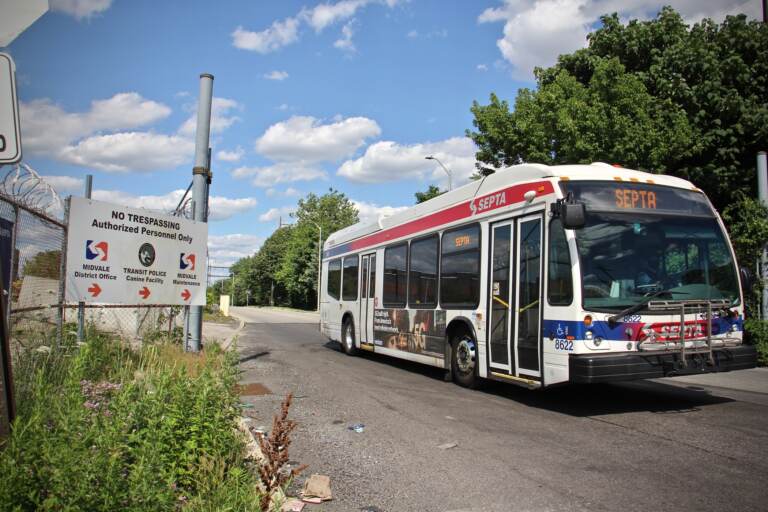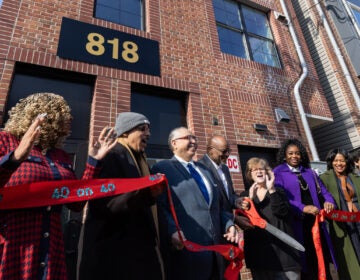SEPTA gas plant in Nicetown up for permit renewal
The first permit approval sparked intense opposition from residents and activists. Now some are calling for more air monitoring.

A bus leaves the Midvale depot in Nicetown. (Emma Lee/WHYY)
A controversial natural gas power plant in North Philadelphia that powers some of SEPTA’s Regional Rail lines is up for permit renewal. The combined heat and power plant began operation about three years ago despite intense opposition from residents and environmental justice advocates, which led to lengthy permit appeals. Those same groups are now pushing for more frequent monitoring of the facility’s pollution.
“We want to understand what is being emitted, and we also want to understand what the impact is on the community,” said Peter Winslow, a member of the interfaith activist group POWER.
Philadelphia’s Air Management Services (AMS) issued an operating permit for SEPTA’s natural gas-powered combined heat and power plant in late 2017. Several groups, citing both climate change and air pollution, unsuccessfully appealed the decision.
As a result, POWER Interfaith, an activist group that focuses on environmental justice and other issues, filed a federal civil rights complaint with the EPA, saying the decision to green light the facility was an example of environmental racism.
More than 90% of residents in the census tract where the facility is located are Black, and in the Nicetown-Tioga neighborhood, more than a third of people live below the poverty line. The neighborhood was already burdened by several other sources of air pollution, POWER’s complaint argued, principally SEPTA’s other operations, like the Midvale Bus Depot. The ZIP code containing the facility has one of the highest childhood asthma hospitalization rates in the city.
“AMS should apply heightened scrutiny to prevent cumulative adverse and disparate impacts on protected populations when making an assessment of an application for an air permit to build and operate a facility such as the Plant that will emit toxic substances in an Environmental Justice Area,” the complaints read. “AMS has failed to do so.”
In 2021, the U.S. Environmental Protection Agency (EPA) took up the civil rights complaint filed by POWER against the city of Philadelphia — a rare move for the agency.
Negotiations of an informal resolution agreement between the city and the EPA are currently pending in the case. EPA declined to provide PlanPhilly additional details about the timeline of the negotiations or what a final agreement could contain.
Residents opposed the gas plant because it burns fossil fuels, which contribute to climate change, and because it emits air pollutants including volatile organic compounds (VOCs) and nitrogen oxides, which react to form ozone.
Philadelphia fails EPA ambient air quality standards for ozone, and already did so at the time the city permitted the SEPTA plant. Ozone can make asthma and other respiratory issues worse.
SEPTA and city officials have countered that the natural gas-powered facility actually lowers greenhouse gas emissions, by replacing higher-emissions electricity from the regional power grid. The city has also said the facility has no significant effect on health or the environment.
Lynn Robinson, who leads one of the groups that appealed to block the original permit, Neighbors Against the Gas Plants, lives less than a mile away from the facility in Germantown. Robinson requested AMS hold a public hearing on the permit renewal. She wants to see continuous pollution monitoring at the plant, also known as Roberts Yard, with results available online for residents to track.
“The City owes the community surrounding SEPTA’s Roberts Yard facility respectful protection,” she wrote in her comment to AMS.
More than 220 people sent the city a form comment prepared by the Clean Air Council, said Russell Zerbo, an advocate at the organization. The form comment requested that AMS increase the frequency of stack testing at the combined heat and power units from the current once every one to three years to at least four times a year.
The SEPTA facility failed a stack test in January 2022, according to an EPA compliance database, then passed the following month. SEPTA paid $1,214 later that year to settle a violation.
The stack testing requirements in the facility’s permit are so infrequent — just once every 8,760 hours of operation of the combined heat and power units or every three years, whichever comes first — that violations could go unnoticed for long periods of time, Zerbo said.
“You’re trying to find these malfunctions as quickly as possible, so you can fix them,” Zerbo said.
POWER, the group that filed the complaint with EPA, supports Clean Air Council’s call for more frequent stack testing at the SEPTA facility, Winslow said.
The group hopes the EPA agreement currently being negotiated changes the way the city makes permitting decisions, not just around the SEPTA gas plant, but for future issues. The group wants to secure meaningful public participation, air quality monitoring that can trigger action, independent health studies, and for the city to consider the cumulative burdens of multiple pollution sources on communities when making decisions, Winslow said.
POWER hoped AMS would incorporate these principles into the current permit renewal process, but so far members haven’t seen that, Winslow said
“In this instance, they have been very disappointing,” Winslow said. “Instead of providing for the kind of meaningful public participation that we have been talking about, they have [done] the minimum.”
A spokesperson from AMS did not respond to PlanPhilly’s questions by the time of publication.

Subscribe to PlanPhilly
WHYY is your source for fact-based, in-depth journalism and information. As a nonprofit organization, we rely on financial support from readers like you. Please give today.









